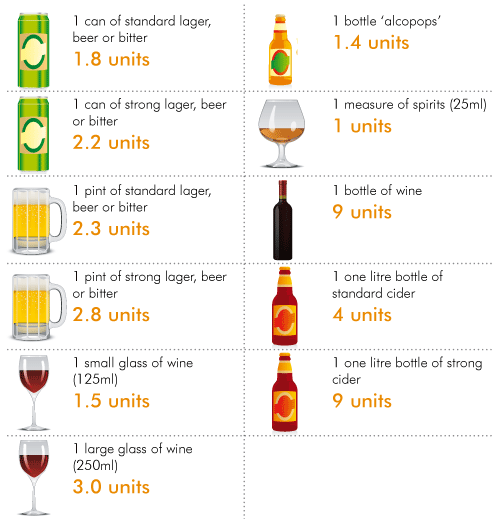QUICK FACT
![]() Experts estimate alcohol is responsible for at least 33,000 deaths in the UK each year.1
Experts estimate alcohol is responsible for at least 33,000 deaths in the UK each year.1
QUICK FACT
![]() In the UK, Government guidelines state you should not drink more than 3-4 units of alcohol a day.
In the UK, Government guidelines state you should not drink more than 3-4 units of alcohol a day.
QUICK FACT
![]() Men who regularly drink more than 2 pints of strong (5.2%) lager every day:
Men who regularly drink more than 2 pints of strong (5.2%) lager every day:
Cigna cookie policy
A "cookie" is a small piece of information which is stored on your browser when you visit a website.
RELATED LINKS
 Guide to alcohol awareness
Guide to alcohol awareness
Introduction
Most people in the UK enjoy a drink or two but few of us stop to consider the effect alcohol can have on our health. You don't have to be an alcoholic to be at risk of damaging your health. Regularly drinking just above recommended levels can be harmful.Use this guide to raise your awareness of the effects alcohol could be having on you.
The effects of alcohol
Alcohol is a drug. It comes from the Arabic word which means 'all things very fine'. When you drink alcohol it is absorbed into the bloodstream within minutes. You can start to feel the effects almost immediately.
Short term effects
Some of the short term effects of drinking too much may be:
- impaired judgment
- lowered concentration and coordination and
- over confidence.
It takes on average one hour for a healthy liver to break down and remove one unit of alcohol.
Contrary to some myths, there's no way to speed up this process and only time will sober you up.
Remember, you might still be over the legal limit for driving the morning after a heavy night's drinking!
Long term effects
Alcohol's hidden harms usually only emerge after a number of years. And by then, serious health problems could have developed.
Liver problems, reduced fertility, high blood pressure, increased risk of various cancers and heart attack are some of the harmful effects of regularly drinking above recommended levels.
The Royal College of Psychiatrists suggests that you may be at risk from drinking too much alcohol if 2:
- You regularly use alcohol to cope with anger, frustration, anxiety or depression.
- You regularly use alcohol to feel confident.
- Your drinking affects your relationships with other people.
- You hide the amount you drink from friends and family.
- You need to drink more and more to feel good.
- You stop doing other things to spend more time drinking.
- You start to feel shaky and anxious the morning after drinking the night before.
- You drink to stop these feelings.
- You start drinking earlier in the day.
How much is too much?
People often talk about alcohol in terms of ‘units'. One unit contains 8g (10ml) of pure alcohol. Drinks contain different amounts of alcohol depending on their size and strength.
The recommended daily amount for women is 2-3 units and the recommended daily amount for men is 3-4 units.
The units found in some standard drink sizes include 3:

Alcohol and work: why does it matter?
Workplaces reflect local communities. Because alcohol abuse is a significant social problem, it's also a workplace issue 4.
Inappropriate drinking before, during and after work can affect accidents at work, performance and morale. It can also affect your relationships, behaviours and impact on work attendance.
Drinkaware research has shown that in the months since the start of the recession there has been a change in the UK's alcohol consumption patterns, such as people turning to alcohol to cope with redundancy.
Helpful tips on cutting down or doing without alcohol:
- Have your alcoholic drink after starting to eat.
- Quench your thirst with non-alcoholic drinks before having an alcoholic one.
- Have a non-alcoholic drink before every alcoholic drink.
- Switch to low-alcohol beer.
- Take smaller sips.
- Plan activities or tasks at those times that you usually drink.
- When bored or stressed have a physical workout instead of drinking.
- Explore new interests - fishing, cinema, social club, exercise.
- Avoid going to the pub after work.
- Avoid, or limit where possible, time with your “heavy” drinking friends.
Drink diary
Keeping a drink diary is a popular tool to help you cut down. Here's how a drink diary could help you:
- Write down how much alcohol you have to drink over one week.
- Try to work out when you found it most difficult to cut down.
- Plan to avoid these situations or plan activities to help you cope with them.
- Ask someone close to you to support and help you.
- Remind yourself and think carefully of all your reasons for cutting down.
Getting help
You can talk to your GP if you are finding it hard to change your drinking habits. You can also consider the following helpful sources:
References
- 1 Drinkaware: http://www.drinkaware.co.uk/facts/effects-of-alcohol-2
- 2 Royal Society of Psychiatrists: www.rcpsych.ac.uk/mentalhealthinfoforall/problems/alcoholanddrugs/alcohol-ourfavouritedrug.aspx
- 3 NHS choices: www.nhs.uk/chq/Pages/853.aspx?CategoryID=87&SubCategoryID=871
- 4 Trade Union Congress Drug and Alcohol Support at work: www.worksmart.org.uk/health/viewsubsection.php?sun=16
If you have any concerns please do not hesitate in contacting your GP. There are also various other sources that you can refer to or contact for further help and information.